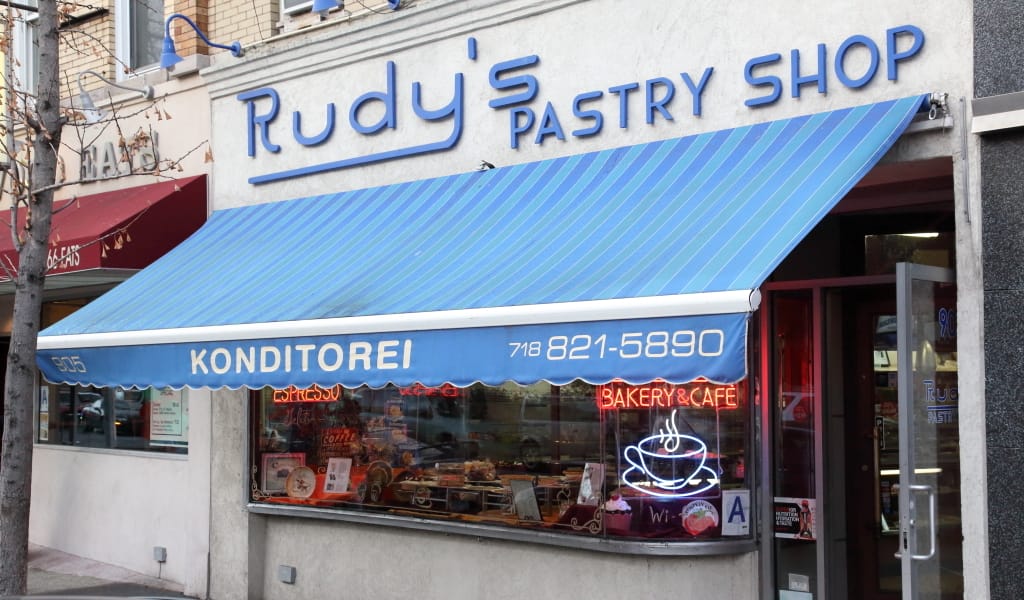Homestead Gourmet Shop in Kew Gardens, with its quaint, peeling sign and cheery strudel-filled front window, looks like a Disney vision of the Old World. Its employees, clad in all white with old-fashioned paper hats, evoke a 1950s soda fountain shop. It feels like a relic in a forgotten corner of the city.
In fact, German fare like the kind served here has become something of a relic in the contemporary American food scene, as changing tastes have led to the shuttering of dozens of old-school German dining institutions around the country. At Homestead, though, this kind of food is alive and well – thanks, in a very Queens-like twist, to a Polish immigrant who went from working at the counter to owning the place.
 “Today is low,” Teresa Wianecka, the owner, said apologetically when we arrived one afternoon, but in fact the shop’s bounty of fresh dishes, sausages, sweets and sandwiches was almost overwhelming. Teresa, who is originally from the Polish city of Stalowa Wola and moved to the United States in 1988, has been working at Homestead for almost 30 years. She left Poland toward the end of the Communist era, hoping to find better economic opportunities for herself and her two children. “I came here with nothing,” she told us, “except 80 dollars in my pocket.”
“Today is low,” Teresa Wianecka, the owner, said apologetically when we arrived one afternoon, but in fact the shop’s bounty of fresh dishes, sausages, sweets and sandwiches was almost overwhelming. Teresa, who is originally from the Polish city of Stalowa Wola and moved to the United States in 1988, has been working at Homestead for almost 30 years. She left Poland toward the end of the Communist era, hoping to find better economic opportunities for herself and her two children. “I came here with nothing,” she told us, “except 80 dollars in my pocket.”
Taking the job at Homestead, Teresa was one of many Polish emigrés to New York who found work in a German-American business. In much the same way that many Italian-owned bakeries and pizzerias around the city have been taken over by Albanian families, Polish has replaced German as the language spoken behind counters of butcher shops and delicatessens around enclaves like Ridgewood and Kew Gardens.
In 2002, Homestead’s original German owners, Edward Markiewic and his sister Martha, sold the place to Teresa. The Markiewics had grown old and Teresa, who had risen up to become manager, knew the business better than anyone else. Martha and her husband, Thadeus, had first opened the delicatessen in 1946 in a neighborhood that would be unrecognizable today. “When the place opened,” Teresa explained, “this area was German, Swiss, Austrian. Now it’s Indian, Russian, a lot of Polish too!”
Teresa was one of many Polish emigrés to New York who found work in a German-American business.
What’s so remarkable about the shop itself is that it’s barely changed at all. Teresa is only the second owner in 73 years, and she’s made an effort to keep it exactly as loyal customers remember it. “We changed the refrigerator and the cheese case,” she told us. A Homestead customer who hadn’t been back in 70 years would recognize almost every detail, from the wood-paneled walls to the flavors of strudel in the window.
Though the store has changed hands, Teresa certainly hasn’t forgotten its roots. “Homestead is German,” she insisted, and despite the addition of a number of Polish dishes, the deli’s heritage is clear in their array of sandwich ingredients. Along with rare roast beef, Black Forest ham, and other common deli meats, bloodwurst, jagerwurst and leberkäse are all favorite orders.
Homestead’s delicious signature cherry, apple, and cheese strudels are a clear draw for many customers. Teresa learned the recipe from her old German bosses, who she says worked for nights on end to perfect the paper-thin dough and cake crumbs that surround the filling.

Cold salads, either to take away by the quart or as an accompaniment to lunch, represent both German roots and Teresa’s Polish innovations – warm potato salad with bacon is clearly German, but next to it is a distinctly eastern European mixture of diced potatoes, carrots and peas in a homemade eggy mayonnaise. Homestead is also one of the city’s only purveyors of German-style herring salad, a holiday special that is made bright pink with beets.
Where Teresa’s cooking really shines, though, is in hot Polish-style dishes like her handmade pierogi or bigos, a hunter’s stew made with pork, beef, sauerkraut and kielbasa. Her stuffed peppers are also divine, heavy with rice and meat and come covered in a rich, sweet tomato sauce.
Homestead is busiest around the holidays – along with lesser-known specialties like the herring salad, Teresa sells turkeys and hams by the dozens for Thanksgiving and Christmas. But even on an average quiet weekday, a steady stream of regulars comes in for lunch. She spends a lot of time with her customers, talking in Polish with some and English with others; some even seem like family members.
For a small crowd of neighborhood people, who have known Teresa since they were children and eat most meals at the deli, Homestead is an institution. Teresa has one customer who comes every day asking what she has cooked up as a daily special. “Even if I’m cooking for myself,” she said, “he says, ‘Can you give me some?’”
This article was originally published on February 26, 2019.
 October 11, 2021 Rudy’s Bakery and Café
October 11, 2021 Rudy’s Bakery and Café
If we could wind the clock back to 1934, to listen in as Rudy’s Bakery rolled its first […] Posted in Queens July 5, 2019 Sfizzicariello
July 5, 2019 Sfizzicariello
If a gastronomia or delicatessen prepares good food, it can survive for decades. But if […] Posted in Naples March 25, 2019 Le Bon Pain
March 25, 2019 Le Bon Pain
Behind the counter at Le Bon Pain in Queens Village, more often than not, is Ghislaine […] Posted in Queens
Ike AllenIke Allen
Published on November 23, 2021
Related stories
October 11, 2021
QueensIf we could wind the clock back to 1934, to listen in as Rudy’s Bakery rolled its first strudel, German is the language we would have heard at the baker’s bench, and beside the glass-fronted display cases, and, more likely than not, on the sidewalk outside, along Seneca Ave. At least since the late 1800s,…
July 5, 2019
NaplesIf a gastronomia or delicatessen prepares good food, it can survive for decades. But if a gastronomia also promotes a social cause, there is a risk that clients will visit once to silence their consciences, and not return. At Sfizzicariello, a “social gastronomia,” the food is at once excellent, and the cause worthy. A group…
March 25, 2019
QueensBehind the counter at Le Bon Pain in Queens Village, more often than not, is Ghislaine Clervoix, a woman in her 80s who has owned the place for more than 30 years. Ghislaine chats in English and Haitian Creole with her regular customers, a few of whom she’s known for decades and introduces as her…



















































































